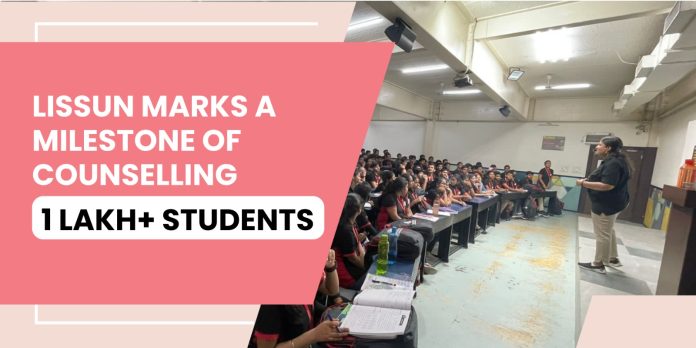- Over 300 high-risk self-harm cases were intervened in the past year
- 1,000+ potential incidents prevented with early counselling and follow-up
- LISSUN’s Omnichannel mental health model is now active in 40+ cities
LISSUN, one of India’s leading mental health platforms, has announced that it has provided comprehensive mental health counselling to over one lakh students across the country. This mission took root in Kota, the coaching hub of India, where rising student suicides had created an urgent need for psychological intervention. In January 2023, LISSUN launched a far-reaching Emotional Wellness Camp in partnership with Career Point University, Kota, marking the beginning of its on-ground mental health interventions for students within academic institutions. So far this year alone, the city has reported 14 student suicide cases, underlining the urgent need for proactive intervention.
The Supreme Court’s landmark July 25 ruling that spotlighted the growing mental health crisis among students across India, underscores Lissun’s efforts over the years in supporting students navigate their journeys while providing the necessary infrastructure to maneuver the mental health challenges. Citing NCRB data that recorded 13,044 student suicides in 2022, the Court laid down 15 binding directions for schools, colleges, hostels, and coaching centres. These include mandatory counsellor appointments, helpline visibility, and adoption of standardised mental health policies. The ruling also recognised psychological well-being as a constitutional right under Article 21, reinforcing that education cannot be divorced from emotional support.
Long before this verdict, LISSUN had recognized this systemic gap and started addressing it through on-ground interventions as early as 2023. Working across 40+ cities, LISSUN has partnered with more than 20 educational and coaching institutions to deliver holistic mental health solutions. These include onsite and virtual counselling, AI-powered risk alerts, and digital screening tools. In the past year alone, LISSUN has intervened in over 300 high-risk self-harm cases and prevented more than 1,000 potential incidents through early identification, counselling, and consistent follow-up. Its licensed psychologists are trained to navigate the pressures students face—academic stress, isolation, and the fear of failure.
Commenting on LISSUN’s achievement, Dr. Krishna Veer Singh, Co-founder and CEO of LISSUN, said, “Being able to support over one lakh students marks a defining moment in our journey to embed mental wellness within India’s educational framework. It highlights the magnitude of unmet psychological needs in academic spaces and the pressing demand for institutional solutions that are both compassionate and clinically robust. Our work with students, educators, and families has shown that systemic support can meaningfully shift outcomes. The Supreme Court’s recent verdict lends powerful validation to this belief, signalling a long-overdue integration of mental health into the core of the educational experience.”
The apex court’s strong stance underscores the long standing mission of Lissun that addresses mental health of children and adolescents as one of the central pillars of the education system for true academic success.
To meet this need at scale, LISSUN has developed a robust omnichannel mental wellness model tailored specifically for academic institutions. This model combines the presence of trained mental health professionals on-site for regular counselling and emergency interventions with digital screening tools that identify at-risk students through structured assessments and AI-driven alerts. It also includes dedicated training modules to help teachers, parents, and students recognise, respond to, and manage mental health challenges. Additionally, helplines and virtual therapy services ensure uninterrupted access to professional care. These integrated solutions are already closely aligned with the Supreme Court’s recent directives and are primed for rapid implementation across institutional settings nationwide.




